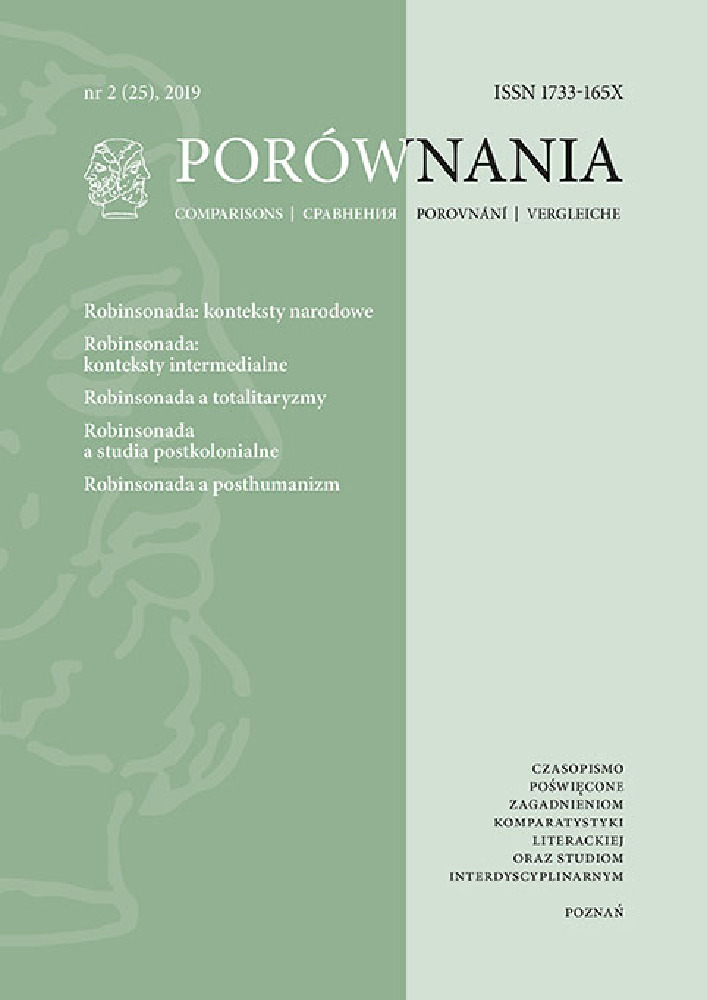Abstract
The story of Robinson Crusoe comes to us in the guise of a first-person narrative based in part on a diary. Successor texts have traditionally adopted the same narrative situation, exploiting it in order to foreground ideas of authorship, textual authority and linguistic dominance. This essay pays particularly close attention to those Robinsonades that have not followed this pattern and have instead opted to omit meta-narration and intradiegetic narrator figures. It considers to what ends this is done in three modern Robinsonades: William Golding’s Lord of the Flies (1954), J. G. Ballard’s Concrete Island (1974), and Michael Dudok de Wit’s animated film The Red Turtle (2016).
References
Ballard, J. G. 1974. Concrete Island. London: Fourth Estate, 2014.
Barrie, J. M. Peter Pan and Other Plays. Ed. Peter Hollindale. Oxford: Oxford University Press, 1995.
Birdsall, Virginia Ogden. Defoe’s Perpetual Seekers: A Study of the Major Fiction. Lewisburg: Bucknell University Press, 1985.
Defoe, Daniel. 1719. Robinson Crusoe: An Authoritative Text, Contexts, Criticism. Ed. Michael Shinagel. New York: Norton, 1994.
Fallon, Ann Marie. Global Crusoe: Comparative Literature, Postcolonial Theory and Transnational Aesthetics. Farnham: Ashgate, 2011.
Golding, William. 1954. Lord of the Flies. London: Penguin, 1960.
Green, Martin. The Robinson Crusoe Story. University Park: Pennsylvania State University Press, 1990.
Kinane, Ian. Theorising Literary Islands: The Island Trope in Contemporary Robinsonade Narratives. London: Rowman and Littlefield, 2017.
Mitchell, Adrian. Man Friday and Mind Your Head. London: Eyre Methuen, 1974.
Orr, Leonard. “The Utopian Disasters of J. G. Ballard”. CLA Journal 43(4) (2000). 479-493.
The Red Turtle. Dir. Michael Dudok de Wit. Culver City: Sony Pictures Home Entertainment, 2017.
Richetti, John. “Defoe as Narrative Innovator.” The Cambridge Companion to Daniel Defoe. Ed. John Richetti. Cambrige: Cambridge UP, 2008. 121-138.
Stevens, Isabel. “Cast Away.” Sight & Sound. July 2016. 35.
License
Utwory opublikowane w czasopiśmie „Porównania”, na platformie Pressto należącej do Uniwersytetu im. Adama Mickiewicza w Poznaniu są udostępniane na licencji Creative Commons Uznanie autorstwa - Bez utworów zależnych 4.0 Międzynarodowe (CC BY-ND 4.0)
Tym samym wszyscy zainteresowani są uprawnieni do korzystania z utworów opublikowanych pod następującymi warunkami:
-
uznania autorstwa — czyli obowiązek podania wraz z rozpowszechnianym utworem informacji o autorstwie, tytule, źródle (odnośniki do oryginalnego utworu, doi) oraz samej licencji
-
bez utworów zależnych — remiksując, przetwarzając lub tworząc na podstawie utworu, nie wolno rozpowszechniać zmodyfikowanych treści.
-
brak dodatkowych ograniczeń — nie można korzystać ze środków prawnych lub technologicznych, które ograniczają innych w korzystaniu z utworu na warunkach określonych w licencji.
Uniwersytet im. Adama Mickiewicza w Poznaniu zachowuje prawo do czasopisma jako całości (układ, forma graficzna, tytuł, projekt okładki, logo itp.).
Autor zachowuje prawa majątkowe, ale udziela zgody Uniwersytetowi im. Adama Mickiewicza w Poznaniu na wykorzystanie dzieła. Autorzy tekstów zakwalifikowanych do publikacji proszeni są o wypełnienie podpisanie i przesłanie umowa (PL) agreement (EN)
Agreement for granting a royalty-free license to works with a commitment to grant a CC sub-license




